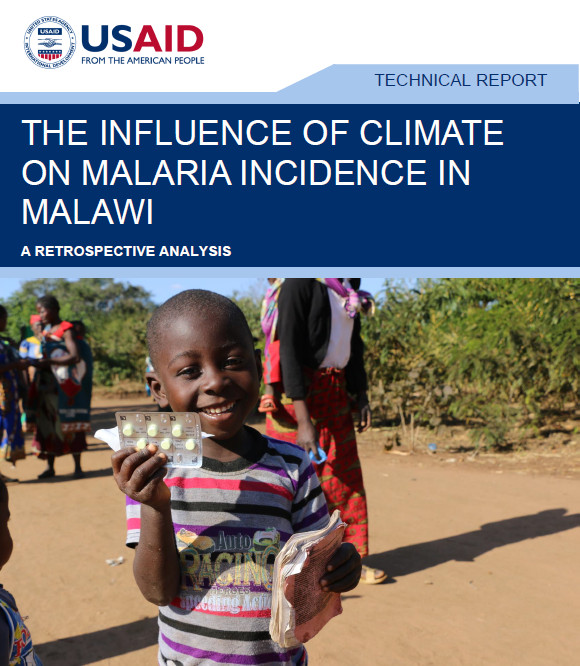
RYAN – THE INFLUENCE OF CLIMATE ON MALARIA INCIDENCE IN MALAWI A RETROSPECTIVE ANALYSIS
Anna Steynor, Chris Jack, Piotr Wolski, Lisa van Aardenne, Chris
Lennard, Sadie J. Ryan, Kris Ebi, Lindsay Allen, Nick Graff, and Fernanda Zermoglio
Article first published online: 1 FEB 2020 USAID Technical Report
EXECUTIVE SUMMARY
This report outlines the results of a study comparing historical rainfall and temperature data with malaria incidence. and explores the future risks from a warming climate for malaria burdens in Malawi. The study provides country-specific insights that contribute to the growing knowledge base of causal links between weather, climate, and malaria in sub-Saharan Africa. Malaria control is a long-standing governmental priority, and vector control has been a cornerstone of the government’s efforts. Within the Health Sector Strategic Plan II (2017-2022), the country’s fourth strategic plan for malaria, Malaria Strategic Plan (MSP) 2017-2022, aims to reduce malaria incidence by at least 50 percent from a 2015 baseline of 386 per 1,000 population to 193 per 1,000, and malaria deaths by at least 50 percent from 23 per 100,000 population to 12 per 100,000 population by 2022. Understanding how, when, and under what circumstances climate variability and change impact health outcomes could offer insights on how to achieve these goals under a changing climate. As in many countries in Africa, the scientific knowledge describing the health risks of weather, climate variability, and climate change needs to be strengthened in Malawi. Malawi’s National Communication to the United Nations Framework Convention on Climate Change and the National Adaptation Program of Action recognize that climate change will bring about health impacts but do not elaborate on the nature or distribution of these impacts. Improved knowledge of current associations between malaria, weather, and climate is needed to formulate evidence based policies and programs. At the same time, there is an increasing call for the establishment of early warning systems informed by in-country research findings. This presents an opportunity to improve the health of Malawi’s communities by better understanding the role that weather and climate play in health, particularly for infectious diseases like malaria.
Read the full USAID Technical Report.